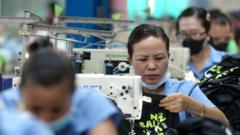Paris Baguette, a prominent Korean bakery chain, is making waves in the international culinary scene by asserting that baked goods like croissants can transcend their French heritage. With hundreds of bustling bakeries across the globe, including stores in France and the UK, Paris Baguette blends the allure of French culture with a distinctly Korean approach to baking.
During a visit to one of their locations, the atmosphere resembles a Parisian cafe, complete with Eiffel Tower decor and tricolor colors. However, under the surface lies a completely Korean operation. "I wouldn't limit our bread to everything from France," said Jin-soo Hur, SPC Group's president and CEO. "We are an international brand. Like croissants, could you say this is a European product? I would say it's a universal product."
SPC Group traces its beginnings to an 80-year old family bakery and has since transformed into a powerhouse, generating sales of $5.6 billion last year while employing 20,000 people. The chain launched its first international location in China in 1988 and currently boasts 4,000 stores across 14 countries, with plans to open more than 1,000 new branches by 2030, particularly in the US.
A significant aspect of Paris Baguette's strategy involves partnerships with global sports teams such as Tottenham Hotspur and previously with Paris St Germaine, enhancing their brand visibility while connecting food with culture. "Food is culture," Hur noted, emphasizing that partnerships bring people together and elevate the brand's profile.
As urbanization fosters a shift toward convenience foods, Asian bakeries like Paris Baguette are adapting to market trends while offering unique flavors influenced by local ingredients. The company has invested in a halal-certified plant in Malaysia to cater to diverse consumer preferences across South East Asia and the Middle East.
While the appeal of Korean culture continues to grow worldwide, there is a rise in the popularity of Asian pastries. Saveria Busato, a pastry chef and bakery expert, noted that the presence of Asian bakeries in countries like Italy reflects this global fascination. However, there are questions surrounding the quality of mass-produced goods, particularly those made from frozen dough. In a blind taste test, Busato expressed concerns over a croissant made with frozen dough, describing it as lacking essential qualities.
Despite challenges posed by rising living costs and inflation, Hur remains focused on spreading their mission beyond profit margins. “We want to change the bread culture around the world,” he stated. “It is good for my country, and good for people.”
Through these efforts, Paris Baguette exemplifies how culinary traditions can evolve while engaging with global cultures, presenting an opportunity to reshape the future of bakery goods on an international scale.






















